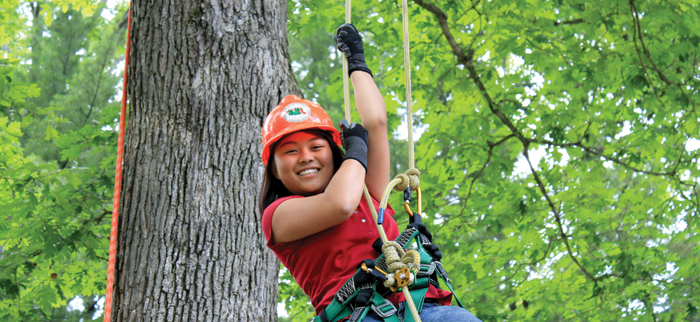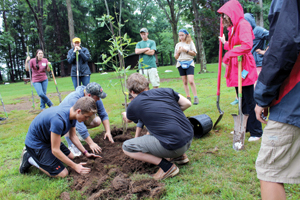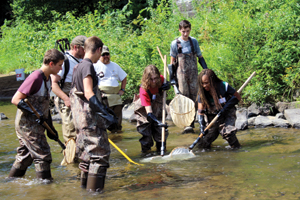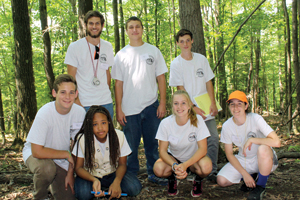Cultivating the Next Generation of Stewards: Natural Resources Careers Camp

Climbing into the canopy with the help of tree care professionals; by Gabrielle Oldham
Nestled in the lush, cool mountains of Western Maryland near the town of Accident, the Natural Resources Careers Camp has quietly carved out an important niche in the region’s environmental education landscape for more than 40 years.
Held each July at the Hickory Environmental Education Center, this weeklong program is designed for high school students living in and around Maryland. It focuses on providing all the tools necessary to make well-informed decisions about potential careers in natural resources.
Camp curriculum
Students participate in a broad range of fun, hands-on activities that help demonstrate the diverse employment opportunities available within the field.
| Activities include collecting forest data, climbing and pruning trees, designing wildlife habitat, creating a map using geographic information and positioning systems, shocking fish, sampling stream macroinvertebrates, identifying trees and soil types, chainsaw safety, using a crosscut saw, developing a forest management plan, various wildlife presentations, career night, college night, and more. |
“My fondest memory is hearing the night sounds program for the first time. I have never heard a more entertaining program—it never gets old,” says Marie Miller, Logistics Director and former participant.
Guest professionals from many natural resource backgrounds help with the activities, but are also there to provide advice and guidance. Guests typically include representatives from the Maryland Department of Natural Resources, Maryland Department of the Environment, Pepco, Davey Tree Service, Bartlett Tree Experts, Verso Paper and consultant foresters, among others.
“College night has always been the highlight of the week for me. The best educational programs in the region are represented on that night,” says Program Director Steve Resh. Colleges that attend typically include Allegany College of Maryland, Frostburg State University, Garrett College, University of Maryland, Penn State University, Virginia Tech and West Virginia University.”
It is not all learning and career development, however. Each day, students have some well-deserved free time to hang out with their new friends, go on a hike, play sports or just relax.
The camp culminates with the students developing and presenting a forest management plan. The structured curriculum prepares them to successfully take on this challenge with the help of their counselor—usually a current Allegany College forestry student. Even those predisposed to natural resources quickly realize that there is much more to learn than they thought.

Students planting a sweetbay magnolia tree; by Gabrielle Oldham
Fork in the road
After attending the program as a counselor, it is hard to overstate its value. It provides a unique service—the only one in the region and is in select company nationally. “Where else are they going to get this information before they’re in college?” asks Camp Director Gabrielle Oldham.
It’s a good point. There are websites and videos with general information about different aspects of natural resources, but relatively very few places where a student can learn about both the science and the career options, and even fewer that actually provide hands-on experience and access to real professionals.
Most students don’t know exactly what they want to do after high school. Many make major decisions based on what they think they might like or what their parents think is reasonable. The camp offers a chance to get definitive answers to their questions so they can more confidently make those decisions before graduating.
Take it from me, a 29-year-old college sophomore. If I had attended this camp when I was in high school, I may not have gone down a different 10-year path before realizing natural resources is where I belong.

Students learning about the variety of fish species found in a healthy stream; by Gabrielle Oldham
The camp is a bargain, even compared with generic overnight summer programs. In most cases, tuition for in-state students is paid through a scholarship offered by the local forestry board or area organizations, typically leaving at most a $125 activity fee.
Making a difference
Each year, students walk away with a real and lasting impact. Many alumni currently hold prominent natural resource positions, and many more gain significant life experiences. Recalling a student with Asperger’s syndrome, Oldham states, “He got along very well and tried things out of his comfort zone.” Later on, she received a letter from his mother. “She said her son came back from camp a changed kid. He got himself a job with a landscaping company, and he enrolled in the natural resource vocational program through his high school. It was the most wonderful letter I have ever received.”

Counselor Schaus (top left) with crew
What you can do
Whether you work in natural resources or just enjoy learning about conservation, fishing, forestry, hunting or wildlife, please spread the word about the Natural Resources Careers Camp. It is a valuable part of environmental education in the region and could be even more valuable if more students and parents are aware of all it offers. As Steve Resh puts it, “If a high school student is interested in natural resources, even a little, attending this camp is a no-brainer.”
| For more information, please visit marylandforestryboards.com or contact your local forestry board. You can also follow the camp on Facebook and Twitter.
If you are a past participant, please email Kevin at kevin.a.schaus@gmail.com to be added to the alumni network. |
Article by Kevin Schaus—Mel Noland Fellowship recipient.
Appears in Vol. 20, No. 2 of the Maryland Natural Resource magazine, spring 2017.


 1-888-373-7888
1-888-373-7888 233733
233733